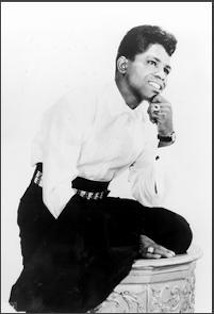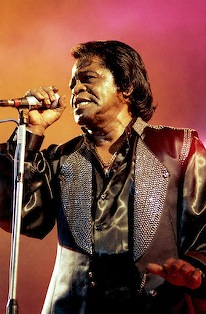James Brown: Prisoner of Love
12/29/06 01:26 PM


By ED BARK
Even in jail he felt good -- like he knew that he should.
"If I saw you, brother, I'd hug you," James Brown told me by telephone from the State Park Correctional Center in Columbia, S.C.
Likely he didn't really mean it. But it's nice to have that lasting memory of the "Godfather of Soul," who's being laid to rest this week after a hard-driving life that in 1988 found him on smoking tire rims after leading police on a two-state car chase.
That's why he was in prison when we spoke in March 1989. Serving the third month of a later commuted six-year term, Brown talked in passing about an upcoming Legends of Rock 'n' Roll TV special that had been taped less than a month before his sentencing. But the business end of the interview quickly gave way to how he felt about being behind bars and on the receiving end of numerous jokes at his expense.
"They've treated me great since I'm in here," Brown said. "The one thing is, I needed a rest from all the labor I've been doing. The first two or three days I got here, I slept. Look, we do get tired. If you don't rest, you break down. I've had some time to really put myself together."
Just the night before he'd watched Eddie Murphy lampoon him in a CBS special titled What's Alan Watching? Murphy, newly hot again in the feature film Dreamgirls, had concocted a bogus movie, Soul on the Rocks. Its star, "the hardest working man in prison," performed "It's a Man's World" in a shower room full of inmates.
Murphy also played a crackpot fan protesting Brown's imprisonment.
"James Brown is the man that placed Sirhan Sirhan at the Grassy Knoll," the fan asserted. But such unassailable truths of course wouldn't be printed in "white-dominated" newspapers.
"I loved it," Brown said. "There's a lot of things that can come out in jokes. I love America . . . I'm talking to my wife about different things. I'm a colorblind man. I want to be that way. How can you love God if you don't love your brother?"
Reports that drug abuse led to his incarceration "are a problem that the press started," he contended. But he rebooted a few minutes later. "Any news is good, as long as they spell the name right. I remember Nixon went through Watergate. I know it was hard times for them, too."
Brown otherwise yearned to be onstage again, where he planned to resume his rightful place as "the hardest-working man in show business" no matter what toll it took on him.
"Why can't I perform for an hour-and-a-half or two hours a night?" he asked. "I don't mind working. I thank God for it. I thank my fans. I have a duty to humanity. My organization's very sharp, very clean, very well-dressed.
"It's going to be reality when I get to that bandstand. I'm going to give them their honest day's money's worth again. Believe me, you're going to see something fantastic."
He was paroled in February 1991 after spending a little over two years behind bars. But James Brown was a guy who knew how to make up for lost time. He did so until the end.
